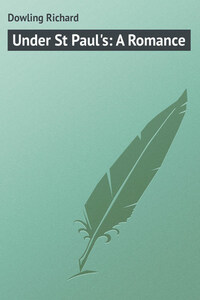CHAPTER I.
THE DUKE'S SWEETHEART
Charles Augustus Cheyne, Duke of Long Acre, had no land. Neither in the United Kingdom nor in any other state of earth did he own a perch of ground. He did not own mines or railways, or Consols, or foreign or domestic stock of any kind. All the money he had was the result of his own industrious fingers, of his own industrious brain. Neither the Heralds' College nor the Lord Chancellor had ever heard of the Duke of Long Acre. The title was one purely of courtesy, conferred upon him by his peers, who were no peers of the realm, but untitled citizens of the Republic of Letters. If he was no duke, he would have furnished sufficient material for making two dukes of satisfactory size, as dukes go now. He was six feet tall, measured fifty inches round the chest, and forty-two round the waist. He had a large, beaming, good-humoured face. He wore no hair on his face; the hair of his head was of a dull dun colour, and always closely cut. No one could remember the colour of his eyes. He was reported to be the strongest and best-tempered man in Fleet Street. He could bend a kitchen-poker into a triangle, and bend it back again, so that one would scarcely notice it had ever been out of shape. He had never struck a man in anger, although he had been often sorely provoked, and more than once absolutely assaulted. On an occasion when a powerful rough attacked him, late at night, in one of the western squares, he had closed with his assailant, caught him round the body, first pinned one hand down, and then the other. Having given his prisoner a good squeeze, which nearly crushed the rough's ribs flat, Long Acre carried the man across the roadway, tossed him over the railings among some shrubs, and walked away. He was never known to curse or swear, or borrow money, or drink too much. His honour was above impeachment; he had never done anything mean or low or shabby. He was a gentleman in the perfect meaning of the word. He dressed in good taste; his clothes always looked fresh, although his coat was often far from new. He walked with the gait of one who would willingly stop to do a favour or lend assistance. He was sufficiently, not oppressively, attentive to women; when men were talking he would always step in gallantly to the rescue of a fair fame. He was loyal to his friends; he would have been forgiving to his enemies, if there were any, but none existed. He made friends very quickly. "I want all the friends I can make," he would say, "for I haven't a single relative alive."
He was thirty-four years of age, and lived in two rooms at the top of a house in Long Acre. With the exception of his rooms all the house was taken up with the business of carriage-making. The name of the carriage-maker was Whiteshaw.
No one of his grace's acquaintances knew anything of his history before sixteen years ago, when he first appeared in Fleet Street. At that time he was a slender, graceful, handsome lad, modest of manner and courteous of address. He was then known as Charles Augustus Cheyne; he had not displayed the wealth of imagination which, later on, caused him to be advanced to the front rank of the peerage. He had a faculty for writing prose stories, which, if never strong, were never vulgar. He would not at any time refer to his past history; and if one put to him a point-blank question, such as "Who was your father, Cheyne?" he would always answer vaguely, "A poor gentleman, who met with a great reverse of fortune, and was ruined and died before I can remember." "And is your mother dead also?" "Yes, my mother is dead also. It is a dismal thing to be as I am without a relative in the world. Let us not speak any more on the subject."
Owing to the splendour of his imagination, which he never allowed for a moment to be dominated by facts, and to the easy and familiar way in which he spoke of the nobility, his friends had created him Duke of Long Acre. Although he preferred being called Cheyne, he answered to the name of Long Acre without any sort of resentment, or even displeasure.
One bright June morning he arose and dressed himself with peculiar care. He had business of the very first importance to transact that day. The Duke of Long Acre had at last given away his heart, and today he was to meet the lady of his choice in Hyde Park at eleven o'clock.
Mrs. Ward, an extremely slatternly woman of fifty, whom Cheyne called his housekeeper-and who came from her home in the Dials, lit his fire and got his breakfast for him of mornings, and made up his rooms, for the modest sum of five shillings a week-had toasted the bacon in a little Dutch oven, and put it on a fiery-hot plate, and made the tea for him, and set forth the milk and bread and butter.
Cheyne sat down and began his breakfast.
"This bacon is delicious, Mrs. Ward," he called out to the charwoman in the next room.
"I am glad you like it, sir."
"Delicious! I could eat a whole pig, Mrs. Ward, I think, if you cooked it."
"It is very good of you to say so, sir."














